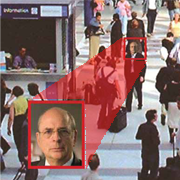The faces of more than 120 million people are in searchable photo databases that state officials assembled to prevent driver’s-license fraud but that increasingly are used by police to identify suspects, accomplices and even innocent bystanders in a wide range of criminal investigations.
The facial databases have grown rapidly in recent years and generally operate with few legal safeguards beyond the requirement that searches are conducted for “law enforcement purposes.” Amid rising concern about the National Security Agency’s high-tech surveillance aimed at foreigners, it is these state-level facial-recognition programs that more typically involve American citizens.
But law enforcement use of such facial searches is blurring the traditional boundaries between criminal and non-criminal databases, putting images of people never arrested in what amount to perpetual digital lineups. The most advanced systems allow police to run searches from laptop computers in their patrol cars and offer access to the FBI and other federal authorities.
Such open access has caused a backlash in some of the few states where there has been a public debate. As the databases grow larger and increasingly connected across jurisdictional boundaries, critics warn that authorities are developing what amounts to a national identification system — based on the distinct geography of each human face.
“Where is government going to go with that years from now?” said Louisiana state Rep. Brett Geymann, a conservative Republican who has fought the creation of such systems there. “Here your driver’s license essentially becomes a national ID card.”
The facial databases have grown rapidly in recent years and generally operate with few legal safeguards beyond the requirement that searches are conducted for “law enforcement purposes.” Amid rising concern about the National Security Agency’s high-tech surveillance aimed at foreigners, it is these state-level facial-recognition programs that more typically involve American citizens.
But law enforcement use of such facial searches is blurring the traditional boundaries between criminal and non-criminal databases, putting images of people never arrested in what amount to perpetual digital lineups. The most advanced systems allow police to run searches from laptop computers in their patrol cars and offer access to the FBI and other federal authorities.
Such open access has caused a backlash in some of the few states where there has been a public debate. As the databases grow larger and increasingly connected across jurisdictional boundaries, critics warn that authorities are developing what amounts to a national identification system — based on the distinct geography of each human face.
“Where is government going to go with that years from now?” said Louisiana state Rep. Brett Geymann, a conservative Republican who has fought the creation of such systems there. “Here your driver’s license essentially becomes a national ID card.”












